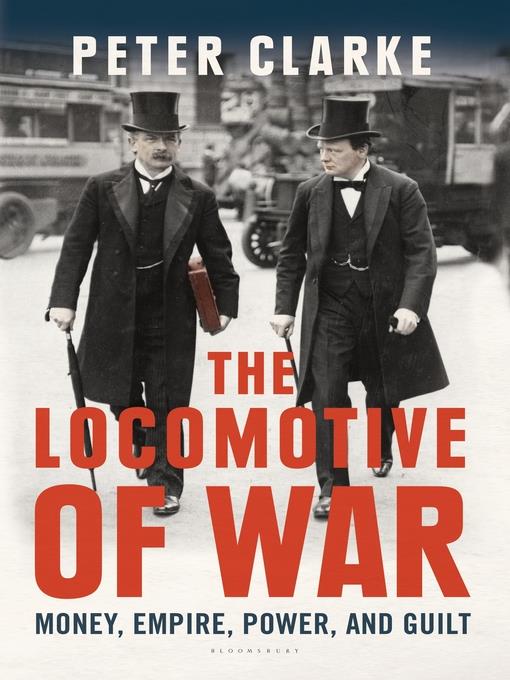
The Locomotive of War
Money, Empire, Power, and Guilt
کتاب های مرتبط
- اطلاعات
- نقد و بررسی
- دیدگاه کاربران
نقد و بررسی

May 1, 2017
“War is the locomotive of history,” Leon Trotsky declared in 1922, and former professor Clarke (Lancashire and the New Liberalism) uses this oft-quoted line as the driving force for his own narrative of world war and the making of liberal internationalism. Apart from their significance as global conflicts, he argues, the two world wars fundamentally altered the nature of Anglo-American capitalism, ushering in an era of full employment and decreasing inequality among classes—in other words, reform, not revolution. To Clarke, fully understanding this transformation involves rethinking the relationship between militarism and the political liberalism that flourished in the first half of the 20th century. Readers prepared for an exploration of these subjects will be disappointed, as Clarke instead embarks on a whistle-stop tour of the lives of prominent Anglo-American liberals, including Winston Churchill, David Lloyd George, John Maynard Keynes, and Woodrow Wilson, detailing their roles in the First and Second World Wars. While Clarke’s tightly coiled prose is as incisive as ever, the focus on great men means the book falls short of its ambitious aims. It succeeds as a reassessment of several historiographical tropes—namely, German war guilt—but never teases out the implications of the dalliance between liberalism and militarism. War, it turns out, is apparently the locomotive of biography.

June 1, 2017
Between the start and close of the Great War of 1914-18, British forces in arms increased from 400,000 to four million. The cost of waging war rose just as dramatically, putting pressure on the country's leaders to reconsider government spending, finance, conscription, and taxation. This illuminating history from Clarke (emeritus, modern history, Cambridge Univ.; Mr. Churchill's Profession) focuses not on the battles fought and lost in the war, but rather on how the conflict forced decision-makers to reconsider how they financed and organized the war effort. Rising leaders were given opportunity as well: British statesman David Lloyd George, British economist John Maynard Keynes, U.S. President Woodrow Wilson, novice politician Winston Churchill, and then-senator Franklin D. Roosevelt. The author explains complicated issues in a masterly way; his discussion of the not always amicable relationship between Keynes and George is salutary. VERDICT There are many books about World War I, but Clarke brings a different perspective by highlighting the individuals who had to make choices that sometimes ran counter to their preferences. This readable account will find (and please) many fans.--David Keymer, Cleveland
Copyright 2017 Library Journal, LLC Used with permission.

May 15, 2017
The former Cambridge history professor returns with a survey of the political and economic ramifications of World War I and the Treaty of Versailles.The narrative's most prominent figures are David Lloyd George (1863-1945), prime minister for much of the war, and John Maynard Keynes (1883-1946), then a young economist advising the British treasury on financing the war and later a prominent critic of the treaty that ended it. Tracing their wartime careers, Clarke (Mr. Churchill's Profession: The Statesman as Author and the Book that Defined the "Special Relationship," 2012, etc.) sets out "to capture an understanding of events and causation as viewed at the time through the spectacles of Anglo-American liberalism." This, he contends, involves a "common heritage of moralism" and "a further important theme--the concept of guilt." The author suggests that "the moralisation of the origins of the war...led to the moralisation of the peace terms" and thus also to the reparations demanded of a defeated Germany, along with acceptance of the notorious "war guilt" clause in the Versailles treaty. However, he argues, the origins of the war might have been found with equal validity and less ensuing bitterness in the inevitable imbalance in European affairs caused by the unification of Germany under Otto von Bismarck and that nation's growing economic and military power. Taken as a whole, the book is pleasantly readable, though casual readers will find the sections on international macroeconomics tough going. The various historical incidents reported are well-researched and presented with clarity and wry humor. However, while Clarke seems confident that he is advancing an intriguing thesis, that thesis proves frustratingly elusive. Themes of economic power, political posturing, and the liberals' tendency to view international affairs through a moral lens recur, but they never coalesce into a coherent argument to reward the reader's effort. Knowledgeable, well-written history that lacks thematic clarity.
COPYRIGHT(2017) Kirkus Reviews, ALL RIGHTS RESERVED.

























دیدگاه کاربران